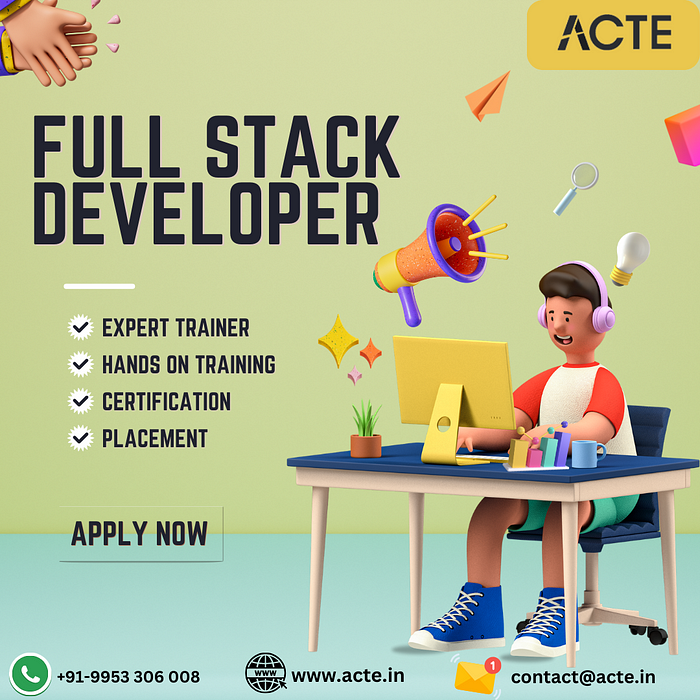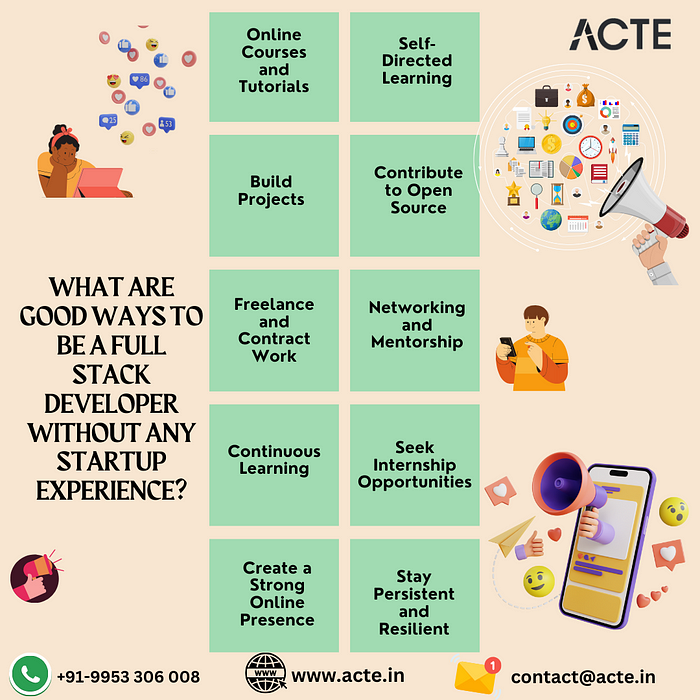Embarking on the journey to becoming a full stack developer without prior startup experience may seem like a daunting task. However, with dedication, perseverance, and a strategic approach, mastering the skills required for this multifaceted role is entirely achievable. In this comprehensive guide, we'll outline a roadmap consisting of ten effective strategies to help aspiring developers navigate the path to full stack development and achieve success.
For those looking to master the art of Full Stack, enrolling in a reputable Full Stack Developer Training in Chennai can provide the essential skills and knowledge needed for navigating this dynamic landscape effectively.

-
Harnessing Online Learning Platforms:
Online learning platforms such as Udemy, Coursera, and Codecademy offer a plethora of courses covering both frontend and backend development. These courses, led by industry professionals, provide a structured curriculum to guide learners through fundamental concepts and advanced techniques. From HTML and CSS to JavaScript frameworks like React and backend technologies such as Node.js and Django, these platforms offer a comprehensive learning experience. By enrolling in courses on these platforms, aspiring full stack developers can acquire the knowledge and skills necessary to kickstart their journey.
-
Self-Directed Study for Self-Motivated Growth:
In addition to formal courses, self-directed study using free online resources is an invaluable way to supplement learning. Documentation, tutorials, and forums related to popular technologies and frameworks provide a wealth of information for self-learners. Platforms like YouTube and freeCodeCamp offer tutorials and guides covering a wide range of topics, allowing learners to delve deeper into areas of interest at their own pace. By taking initiative and exploring these resources, aspiring full stack developers can gain a solid foundation in web development principles and practical skills.
-
Project-Based Learning:
Practical experience is essential for mastering full stack development. Building projects allows learners to apply theoretical knowledge to real-world scenarios, solidifying their understanding and honing their skills. Starting with simple projects like personal websites or basic web applications, learners can gradually increase the complexity of their projects as they gain confidence. Building a diverse portfolio of projects not only showcases skills to potential employers or clients but also demonstrates the ability to tackle various challenges effectively. By embracing project-based learning, aspiring full stack developers can accelerate their learning and development.
-
Contributing to Open Source Communities:
Contributing to open-source projects on platforms like GitHub offers valuable opportunities for collaboration and skill development. By participating in open-source communities, learners can gain practical experience working on real-world projects alongside experienced developers. Contributing to projects, whether by fixing bugs, adding features, or improving documentation, allows learners to apply their skills in a collaborative environment. Additionally, working with version control systems like Git and learning from code reviews and feedback enhances learners' understanding of best practices and industry standards. Open-source contributions not only build technical proficiency but also foster a sense of community and camaraderie among developers.
-
Exploring Freelance Opportunities:
Freelance work provides a platform for aspiring full stack developers to gain practical experience, build their portfolio, and earn income. Platforms like Upwork, Freelancer, and Toptal connect freelancers with clients seeking web development services. Starting with small projects allows learners to gain hands-on experience while gradually expanding their skills and expertise. Freelancing offers the flexibility to work on a variety of projects, from building websites and web applications to providing maintenance and support services. By taking on freelance opportunities, aspiring full stack developers can gain valuable experience, establish a professional reputation, and pave the way for future career opportunities.
It's also critical to select the right strategies and methods, and developing the necessary abilities is just as critical. Here's where getting certified with the Top Full Stack Online Certification can help a lot.

-
Networking and Mentorship:
Networking with other developers and industry professionals provides valuable opportunities for guidance, support, and collaboration. Attending meetups, joining online forums and communities, and participating in developer events allows learners to connect with peers and experienced professionals. Building relationships with mentors and peers fosters a sense of camaraderie and provides access to valuable insights and advice. Mentorship programs offer personalized guidance and support, helping learners navigate challenges and accelerate their learning. By actively participating in the developer community and seeking mentorship, aspiring full stack developers can expand their network, gain valuable insights, and foster personal and professional growth.
-
Continuous Learning and Adaptability:
Continuous learning is essential for staying updated with the latest trends, technologies, and best practices in web development. Following industry blogs, subscribing to newsletters, and participating in online communities keep learners informed about emerging technologies and advancements. Platforms like Medium, Dev.to, and Hacker Noon provide valuable insights and perspectives from industry experts and thought leaders. Additionally, online courses and workshops offer opportunities to deepen understanding and acquire new skills in specific areas of interest. By dedicating time to continuous learning, aspiring full stack developers can stay competitive and adapt to the evolving landscape of web development effectively.
-
Exploring Internship Opportunities:
Internship opportunities provide invaluable hands-on experience and exposure to real-world projects and workflows. Companies and startups often offer internship programs for aspiring developers to gain practical experience and mentorship from industry professionals. Internships allow learners to apply theoretical knowledge to practical scenarios, develop professional skills, and build a professional network. Additionally, internships provide insights into company cultures and industry practices, helping learners make informed decisions about their career paths. By seeking out internship opportunities, aspiring full stack developers can gain valuable experience, establish connections, and kickstart their careers in web development.
-
Establishing a Strong Online Presence:
Building a strong online presence is essential for showcasing skills, projects, and achievements to potential employers or clients. Creating a personal website or portfolio allows learners to showcase their projects, skills, and experiences in a professional manner. Additionally, platforms like LinkedIn, GitHub, and Stack Overflow provide opportunities to connect with peers, share knowledge, and engage with the developer community. By actively participating in online communities, contributing to discussions, and sharing insights, learners can establish themselves as knowledgeable and engaged members of the developer community. A strong online presence not only enhances visibility but also opens up opportunities for networking, collaboration, and career advancement.
-
Persistence and Resilience:
Persistence and determination are essential qualities for success in full stack development. The learning process can be challenging and filled with setbacks, but maintaining a positive attitude and staying focused on long-term goals is key. Embracing challenges as opportunities for growth and learning, and not being discouraged by failures or setbacks along the way, are vital. Staying committed to continuous improvement, seeking support from peers and mentors, and celebrating achievements and milestones along the journey are essential. By cultivating persistence and resilience, aspiring full stack developers can overcome obstacles and achieve their goals in web development.
Conclusion:
Navigating the path to full stack development without startup experience requires dedication, perseverance, and a proactive approach to learning and skill development. By leveraging online resources, building projects, contributing to open source, seeking freelance opportunities, networking with peers and mentors, and continuously learning and adapting, aspiring developers can accelerate their journey and achieve success in the dynamic field of web development. With persistence, resilience, and a passion for learning, the possibilities for growth and advancement in full stack development are limitless.





